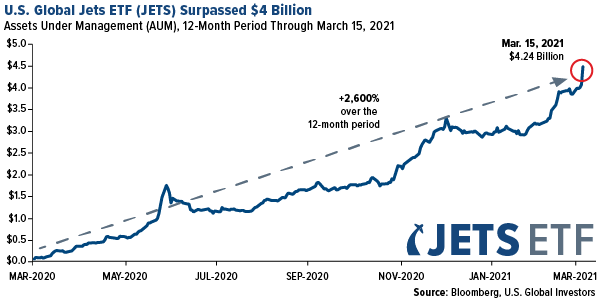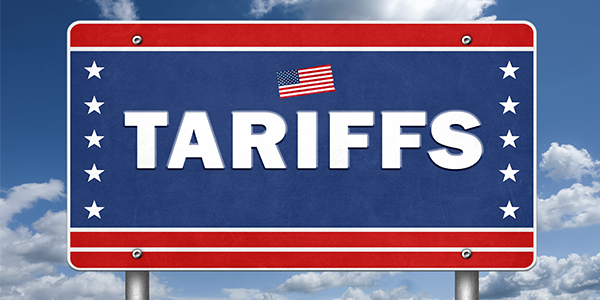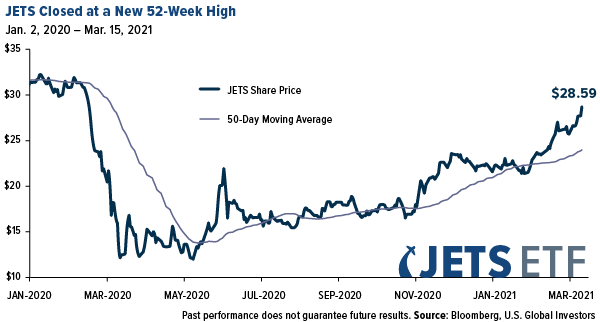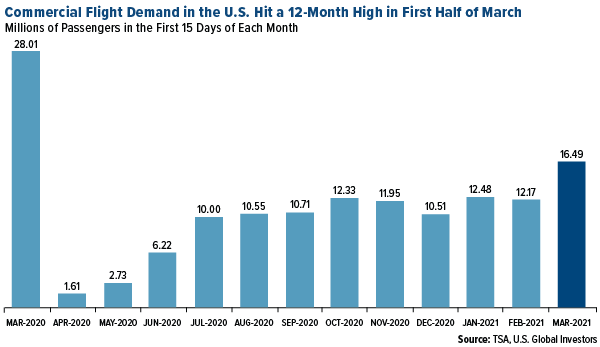

U.S. Global Jets ETF (JETS) Surpassed $4 Billion in Assets Under Management (AUM) as Commercial Flight Demand Hit a 12-Month High
U.S. Global Jets ETF (JETS) Surpassed $4 Billion in Assets Under Management (AUM) as Commercial Flight Demand Hit a 12-Month High
U.S. Global Investors, Inc. (Nasdaq: GROW) (“the Company”), a boutique registered investment advisory firm that focuses on niche markets around the world, is pleased to announce that its airlines ETF, the U.S. Global Jets ETF (JETS), reached a new milestone by surpassing $4 billion in assets under management (AUM). As of market close on March 15, 2021, JETS AUM stood at approximately $4.24 billion, a more than 2,600% increase from a year earlier.
In addition, JETS closed at a 52-week high of $28.59 on March 15, 2021, an approximately 140% increase from its pandemic low set on May 15, 2020.
“We couldn’t be more thrilled with how JETS has done over the past 12 months, and we want to thank investors big and small for making it a $4 billion ETF,” says Frank Holmes, CEO and chief investment officer of U.S. Global Investors. “Our smart-beta 2.0 ETF is still the only pure-play global airlines investment vehicle currently available, with a distinctive portfolio structure that uses five key factors to pick stocks.”
Launched in 2015, JETS began attracting significant assets when airline stocks plunged in February and March 2020 due to the COVID-19 pandemic. In the first 50 trading days of 2020, before the crisis, average daily trading volume was about 315,000 shares. A year later, this figure had jumped to approximately 6.7 million shares traded per day on average, a 21x increase. Participants have been as varied as retail investors to hedge funds to insurance companies.
Now, as we head into the busy spring and summer travel seasons, we’re starting to see a substantial recovery in commercial flight demand. Close to 1.4 million passengers were screened at U.S. airports on Friday, March 12, 2021, representing the greatest volume for a single day since March of last year. In the first half of March 2021, nearly 16.5 million total passengers boarded commercial jets in the U.S., the most for any month since March 2020.
“We make sure to track the U.S. Transportation Security Administration’s (TSA) daily report on passenger volume because we’ve found it to be a reliable proxy for investor appetite,” continues Mr. Holmes. “Before the pandemic, approximately 2.2 million people were cleared by the TSA per day, with international arrivals and departures making up the bulk of the volume. A year later, domestic leisure travel is beginning to rebound while international flights remain muted due to lockdowns in Canada, the European Union (EU) and elsewhere.”
The rate at which vaccines are being administered is accelerating in the U.S., which we believe is highly constructive for travel and tourism in general and airlines specifically. The Biden administration recently directed all 50 states to make every adult aged 18 and over eligible to receive the COVID-19 vaccine by May 1 of this year. Anticipating a summer surge, a number of domestic low-cost carriers, including Southwest and Allegiant, have announced plans to expand their networks.
United Airlines became the first U.S. carrier to say it expected to be cash flow positive in March 2021 for the first time since the pandemic began. Other carriers have likewise signaled their optimism going forward as vaccinations continue to ramp up.
To learn more about the U.S. Global Jets ETF (JETS), click here.
Please consider carefully a fund’s investment objectives, risks, charges and expenses. For this and other important information, obtain a statutory and summary prospectus by visiting www.usglobaletfs.com. Read it carefully before investing.
Investing involves risk, including the possible loss of principal. Shares of any ETF are bought and sold at market price (not NAV), may trade at a discount or premium to NAV and are not individually redeemed from the fund. Brokerage commissions will reduce returns. Because the fund concentrates its investments in specific industries, the fund may be subject to greater risks and fluctuations than a portfolio representing a broader range of industries. The fund is non-diversified, meaning it may concentrate more of its assets in a smaller number of issuers than a diversified fund. The fund invests in foreign securities which involve greater volatility and political, economic and currency risks and differences in accounting methods. These risks are greater for investments in emerging markets. The fund may invest in the securities of smaller-capitalization companies, which may be more volatile than funds that invest in larger, more established companies. The performance of the fund may diverge from that of the index. Because the fund may employ a representative sampling strategy and may also invest in securities that are not included in the index, the fund may experience tracking error to a greater extent than a fund that seeks to replicate an index. The fund is not actively managed and may be affected by a general decline in market segments related to the index. Airline companies may be adversely affected by a downturn in economic conditions that can result in decreased demand for air travel and may also be significantly affected by changes in fuel prices, labor relations and insurance costs.
Smart beta refers to a type of exchange-traded fund (ETF) that uses a rules-based system for selecting investments to be included in the fund portfolio. Positive cash flow indicates that a company is adding to its cash reserves, allowing it to reinvest in the company, pay out money to shareholders, or settle future debt payments.
The outbreak of the COVID-19 pandemic and the resulting actions to control or slow the spread has had a significant detrimental effect on the global and domestic economies, financial markets and industries, including airlines. U.S. Global Investors continues to monitor the impact of COVID-19, but it is too early to determine the full impact this virus may have on commercial aviation. Should this emerging macro-economic risk continue for an extended period, there could be an adverse material financial impact to the U.S. Global Jets ETF.
Distributed by Quasar Distributors, LLC. U.S. Global Investors is the investment adviser to JETS.
All opinions expressed and data provided are subject to change without notice. Opinions are not guaranteed and should not be considered investment advice.
































